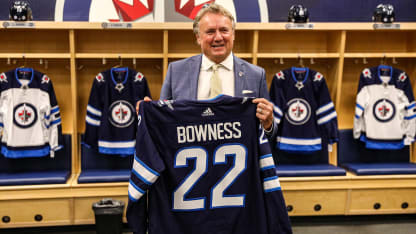In NHL.com's Q&A feature called "Sitting Down with …" we talk to key figures in the game, gaining insight into their lives on and off the ice. In this special offseason edition, we feature new Winnipeg Jets coach Rick Bowness, who was hired Sunday.
Bowness talks joining Jets as coach in Q&A with NHL.com
NHL leader in games coached started career in Winnipeg, discusses experience gained in past 40 years

By
Tim Campbell
NHL.com Staff Writer
WINNIPEG --Rick Bowness said he does not have any issues with being seen as the Winnipeg Jets' second choice, knowing they first courted Barry Trotz, who told them June 24 he wasn't going to coach next season.
"There were a lot of good coaches in my position, that were the second choice, right?" Bowness said Monday. "I'm not alone in that. There were a lot of quality guys that were interviewed that are good coaches in this League and they were all behind Barry. I just think, for obvious reasons, Barry was the No. 1 choice and that doesn't bother me one bit."
Bowness hails from Moncton, New Brunswick, and replaces Dave Lowry, who was 26-22-6 in 54 games after Paul Maurice resigned Dec. 17.
It's the second time the 67-year-old has been hired as Winnipeg's coach. He became coach of the original Jets on Feb. 7, 1989, after Dan Maloney was fired, and went 8-17 with three ties to finish the season.
Most recently, he was 89-62-25 in three seasons as the Dallas Stars coach, after replacing Jim Montgomery on Dec. 10, 2019. Bowness guided Dallas to the 2020 Stanley Cup Final, a six-game loss to the Tampa Bay Lightning.
This season, the Stars went 46-30-6 and were the first wild card in the Stanley Cup Playoffs from the Western Conference. Bowness resigned May 20 after the Stars lost Game 7 to the Calgary Flames in the first round.
Jets general manager Kevin Cheveldayoff said Monday he quickly reached out to Bowness after Trotz said he wouldn't be coaching next season. Bowness said he won't waste any time worrying about that delay.
"I understand why they would have pursued Barry, and I would have done the same thing," Bowness said. "Him being from [Manitoba] and the success he's had, having won the Stanley Cup [in 2018 with the Washington Capitals], I would have done the exact same thing."
Bowness is 212-351-28 with 48 ties in 639 regular-season games as coach of the Stars, Phoenix Coyotes, New York Islanders, Ottawa Senators, Boston Bruins and Jets, and 26-23 in 49 postseason games.
His stints as coach, associate and assistant in the NHL amount to 2,787 games behind the bench (2,562 regular-season and 225 playoff games), more than any coach in League history.
NHL.com caught up with Bowness at Canada Life Centre after the press conference introducing him as coach and discussed several topics, including his vision for the Jets.
What needs to change, what's going to change in Winnipeg?
"The culture was an issue last year. From all the players' comments, it's an issue. X's and O's don't work if the culture isn't on, if everyone's not bought in. So, we have to change that. That's what I'm going to be working on over the summer in my conversations with the players, so when we get to training camp, everyone will know the expectations. The first thing we have to change is some attitudes and the culture around the team."
How quickly can you do those things?
"A very good question. Just judging by the initial reaction, I think it helps a lot that the players are so frustrated by how they finished last season. That's a big help. They didn't like the way they played, they didn't like the way the season ended. So, they were all disappointed and that helps me change things around a little bit. I've got to get the right mental attitude going into camp."
What disappointed or bothered you about the way your time ended in Dallas?
"Nothing really. There were some issues we had to deal with as a staff, with some attitudes and things that weren't there the year before. But that's fine, it's all part of coaching in today's NHL. The most important thing is the staff, we got together, and we pushed that team as far as they could go, and we were that close to moving on to play [the Edmonton Oilers] in the second round. We got into Game 7 in overtime (against Calgary) and we had some Grade A scoring chances we didn't score on. So, then we walk away as a staff and said we pushed that team as far as we could have. I'm not really disappointed in anything about that. Could we have won a few more games? Absolutely. Would it have changed our standing? No. We weren't a 110-point, 115-point team. So, we pushed that team as far as it could go. We felt good about that as a staff."
What's the most valuable advice you've gotten from somebody on your coaching journey?
"I would say it's just, be true to yourself. I don't know if I just kind of developed that or was taught that. When I got into coaching, I knew I wanted to coach the way I wanted to be coached. It's a long time ago, but (former Jets coach) Tom Watt had a big influence on me, the first coach I played for that was very detailed and well-prepared for practice and everything he did. That was innovative back then and it was about being ready, being prepared, being structured, have your practices ready. That opened my eyes as a player but my whole mental approach to coaching, I've always said this, if I'm going to coach, I'm going to do it my way and if I get fired, I'm doing it my way, not somebody else's."
You have extensive experience in your 40 years of coaching, including as an assistant and an associate. How difficult is that transition to being in charge and how valuable is that experience when you do move up?
"I'm not sure I ever looked at it that way. I always see that there's a job to do coaching this team regardless of the role. I know there are coaches that would never go back as an assistant. I wanted to coach. I love the game, so I wanted to stay in coaching, so I took a lesser role in places. Never cared much about the titles. As long as I was given the freedom -- and I was by every coach I ever worked with -- to do what I could do and do it my way. I was fortunate to be able to do that. I never worked for a head coach who said, 'No, you're not doing that, or you can't do it that way.' It was important to me to work with people who would let me do my thing, who could trust me to do it my way and handle it. That helped me a lot. I think the hard part would have been, and I'd probably never had accepted a job that way anyway, is if they wouldn't let me do it my way."
You were hired to coach the original Jets on Feb. 9, 1989, more than 33 years ago. What stands out about that first time as the coach?
"Look how young I looked back then. What I remember about that was when they called to tell me they were bringing me up from Moncton (of the American Hockey League) to replace Dan Maloney, I wasn't keen on it because I knew I wasn't ready. Deep down I knew it. My first year in Moncton, a year earlier … we had 12 rookies right out of college and we had a tough year and then the next year when they called, we were in first place and challenging and I thought we could have won it that year. I was that confident about the team. So, I was disappointed that I couldn't finish that job, but you do what the organization asks you to do."
How is Rick Bowness the coach different than all those years ago?
"More knowledgeable about the game and about coaching. I wasn't ready for that first job. I'm more confident about coaching today's players. It was a totally different era now. Even back then, I was more of a communicator. I wasn't a my-way-or-the-highway kind of guy back then. I was never that kind of coach. I think my style is better over the past 10 or 12 years than it was back then, just because it was so different then to be open and to be communicating and trying to be closer to your players. That wasn't how it was when I played and that's not how things were done back then. When I went to Boston (in 1991-92), it probably cost me my job because they were so old-school and hard and I wasn't. I was very open with the players, and communicating with the players, and when I look back at that and we won two rounds and went to the conference final and I was out of a job, I think it was my approach with the players and my communication that bothered them. And that was a big part of me losing that job. But I'd rather do it my way and lose a job than change the way I do things."
Photo credit: Katie MacLeod/Winnipeg Jets

















